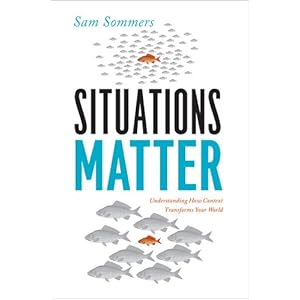I also have a colleague who is very much in the "free will" camp philosophically and I have a difficult time convincing him about the social forces that shape our behavior. If you are like me then you will love this new book I had the opportunity to review recently. It is called, Situations Matter: Understanding How Context Transforms Your World
For years I have struggled with coming up with great examples and additional research that had not been dealt with by the introductory texts. Now I have that book I've been looking for. Some highlights and observations from my dog-eared copy:
- judging people's expertise by our own narrowly ranged knowledge base
- being seduced by character is something we do when attributing explanations of behavior
- using famous people in advertising testimonials--do they really use the products they are hawking?
- realizing that situations are often invisible to us--we need to learn how to see them and their influence (the tools in this book can help me do this with my students)
- Numerous explanations of situations and the influence of context on people's behavior ("what's wrong with these people?"
- The wisdom of crowds--how real is it? when should we use/avoid it?
- Asch's study, conformity and mimicry of nonverbal behavior
- Who are you? An examination of self-definition that is flexible by situation and context
- What we think we will do and what we do are often very different things--some research
- A breakdown of the Singer-Schacter experiment--some details that are missing in the textbooks
- An overview of what is commonly called "The Lake Wobegon Effect"--where everyone is above average
- how we are skilled at self-deception
- achievement based on what we are told about intelligence
- gender differences--how much is biology and how much is society
- proximity and love--how location influences who we are attracted to
- how making yourself visible makes you more attractive
- Much, much more
If you have questions for the author, please comment below and we will do our best to get them answered.
You can find more of the author and this book at these links:
Author's website
posted by Chuck Schallhorn







2 comments:
Chuck, thanks for the writeup-- glad you enjoyed the book and found it potentially useful for your teaching!
-Sam
I'm glad that you found the book so useful for your classroom work! Thanks for being a part of the book tour.
Post a Comment